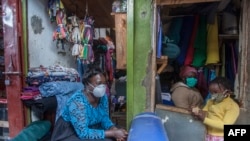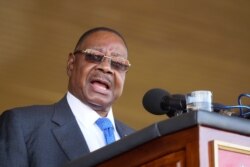Malawi is seeing a surge in COVID-19 cases as citizens return from South Africa, the country hit harder than any other in Africa. Hundreds of returnees are expected to arrive in Malawi this week, raising fears the figures will increase even more.
Out of nearly 1,000 Malawian migrant workers who recently came home, 134 tested positive for the coronavirus, almost doubling the country's total cases. Malawi started registering a rise in COVID-19 cases on Thursday, a few days after the return of a group of migrant workers who had been stranded in South Africa because of a coronavirus lockdown.
Of the 102 cases confirmed Thursday, 92 were among the returnees, the highest number of new cases in a single day since Malawi confirmed its first case on April 2.
The trend continued this week. The Presidential Task Force on COVID-19 said out of 52 cases confirmed Monday, 42 were from people who have just returned from South Africa.
And in a more alarming development, about 400 returnees escaped last week from a stadium where they were being held in quarantine. Officials are concerned the escapees will spread the virus when they go back to the rural areas where most of them live.
Dorothy Ngoma, former president of Malawi’s National Organization of Nurses and Midwives, told VOA that it’s time for Malawian political leaders and clergy to help teach people about ways to prevent the virus from spreading.
“We must go house to house and I want to encourage UTM [United Transformation movement Party], Malawi Congress [Party], DPP [Democratic Progressive Party], whatever party; the chiefs, the churches to continue doing this 24 hours a day until we make sure that everybody understand,” said Ngoma.
Critics blame the government for failing to enforce anti-coronavirus measures, which include social distancing, use of face masks and closing borders to prevent imported coronavirus.
Speaking on live television Monday, President Peter Mutharika said his administration has tried to contain the spread of the virus but politics has undermined those efforts. The country is preparing for a June 23 presidential election.
“Our fight against coronavirus is being undermined by politics and politicians. The courts stopped us from going on a lockdown. The same courts want us to go to an election. Now, we have a situation that is encouraging everybody to campaign and undermining social distancing,” he said.
Mutharika, who later in the day conducted a political rally, said it is now up to Malawians to choose between fighting coronavirus and going to an election.
A survey released this week about public perception of COVID-19 has shown that 82 percent of Malawians are more scared of hunger than being infected with coronavirus.
Boniface Dulani is the research director at the Institute for Public Opinion and Research, which conducted the survey.
“Our findings, interestingly enough, also show that Malawians support that the elections should be held notwithstanding the risk of coronavirus. So this actually has basically made people think that maybe social distancing is not the best way to fight the coronavirus, which is really dangerous in itself,” said Dulani.
Health experts have warned that the ongoing political rallies, coupled with the return of people from South Africa, puts Malawi at higher risk of more COVID-19 cases in the near future.





